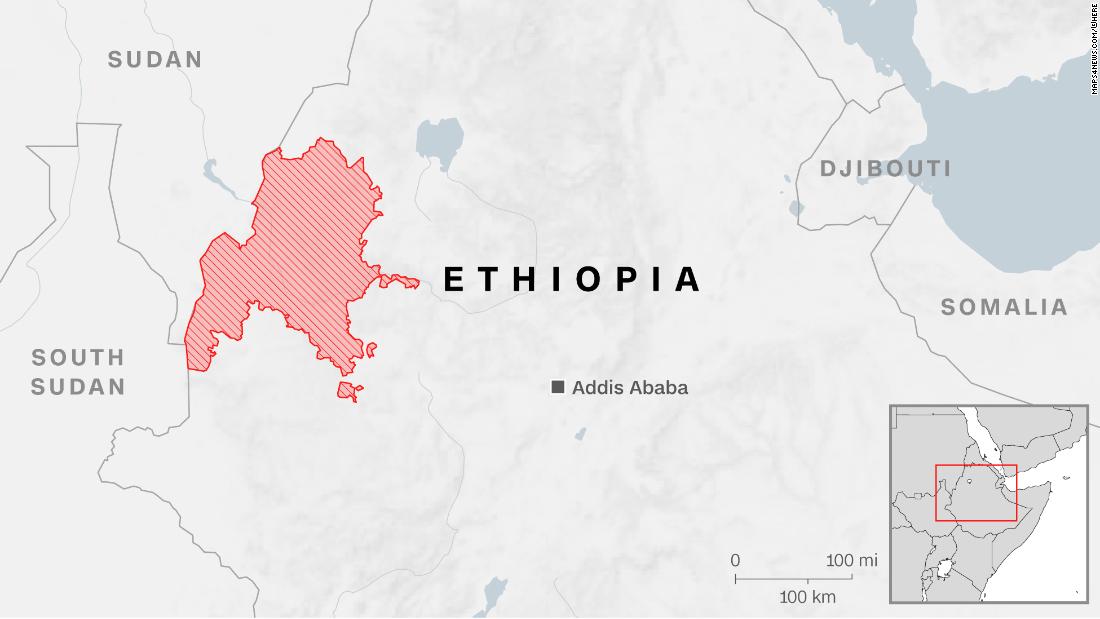
The attack took place in the village of Bekoji in Bulen County in the Metekel area, the Ethiopian human rights commission said in a statement in an area where several ethnic groups live.
The second most populous country in Africa is facing regular outbreaks of deadly violence since Prime Minister Abiy Ahmed was appointed in 2018 and has accelerated democratic reforms that have weakened the state’s iron grip on regional rivalries.
The elections to be held next year have further inflamed hot tensions over land, power and resources.
Ethiopian Prime Minister Abiy Ahmed said on Thursday that he had deployed forces in the western Benishangul-Gumuz region.
“The massacre of civilians in the Benishangul-Gumuz region is very tragic,” Abiy said on Twitter. “The government, in order to solve the root causes of the problem, has deployed a necessary force.
In a separate part of the country, the Ethiopian army has been fighting rebels in the northern Tigray region for more than six weeks in a conflict that has displaced nearly 950,000 people. The deployment of federal troops there has raised fears of a security vacuum in other resilient regions.
Ethiopia is also fighting an insurgency in the Oromiya region and faces long-term security threats from Somali Islamist militants along its eastern border.
Gashu Dugaz, a senior regional security official, said authorities were aware of the Benishangul-Gumuz attack and were verifying the identities of the attackers and victims, but did not provide further information.
The region is home to several ethnic groups, including the Gumuz people. But in recent years, farmers and businessmen in the neighboring Amhara region have begun to move to the area, prompting some Gumuz to complain that fertile land has been taken.
Some Amhara leaders now say that part of the land in the region – especially in the Metekel area – rightly belongs to them, statements that annoyed Gumuz.
“People who came from the ‘forest’ were involved in the previous attacks, but in this case, the victims said they knew those involved in the attack,” the rights commission said in a statement.
Belay Wajera, a farmer in the western town of Bulen, told Reuters that he counted 82 bodies in a field near his home after Wednesday’s raid. He and his family woke up to gunshots and fled their homes as men shouted “catch them,” he said. The wife and five of his children were shot and he was shot in the buttocks, while four other children have escaped and are now missing, Wajera told Reuters by telephone late Wednesday.
Another city resident, Hassen Yimama, said gunmen stormed the area around 6:00 a.m. local time. He told Reuters that he counted 20 bodies in another location. He took his own weapon, but the assailants shot him in the stomach.
A local doctor said he and his colleagues treated 38 people, most of them with gunshot wounds. Patients told him about relatives who were killed with knives and told him that gunmen set fire to houses and shot people trying to escape, he said.
“We were not prepared for this and we no longer have medicines,” a nurse from the same unit told Reuters, adding that a five-year-old child died while being transferred to the clinic.
The attack came a day after Abiy, the army’s chief of staff and other senior federal officials visited the region to demand calm after several deadly incidents in recent months, such as a November 14 attack in which gunmen they targeted a bus and killed 34 people.
“The enemy’s desire to divide Ethiopia along ethnic and religious lines still exists. This desire will remain unfulfilled,” Abiy wrote on Twitter, along with photos of his meetings that day in Metekel, near where it took place. the November 14 attack.
He said the people’s desire for peace “goes beyond any divisive agenda.”
Ethiopian Prime Minister Abiy Ahmed said on Thursday that he had deployed forces in the western Benishangul-Gumuz region, a day after gunmen killed more than 100 people in the area, who recorded regular ethnic violence.
On Wednesday, the state-run Ethiopian human rights commission said gunmen had killed more than 100 people in a dawn attack in the village of Bekoji in Bulen County in the Metekel area, where many ethnic groups live.
“The massacre of civilians in the Benishangul-Gumuz region is very tragic,” Abiy said on Twitter. “The government, in order to solve the root causes of the problem, has deployed a necessary force.